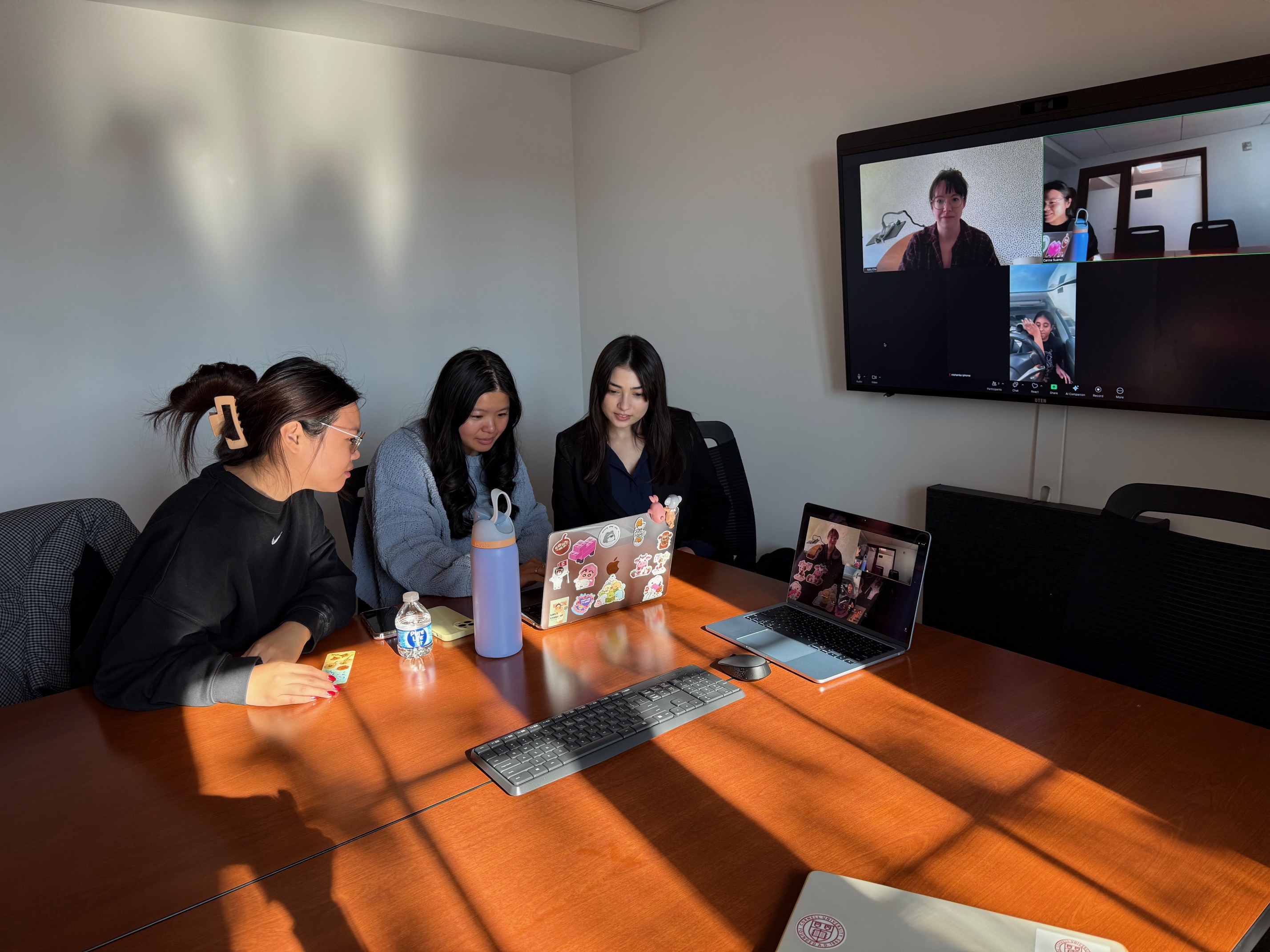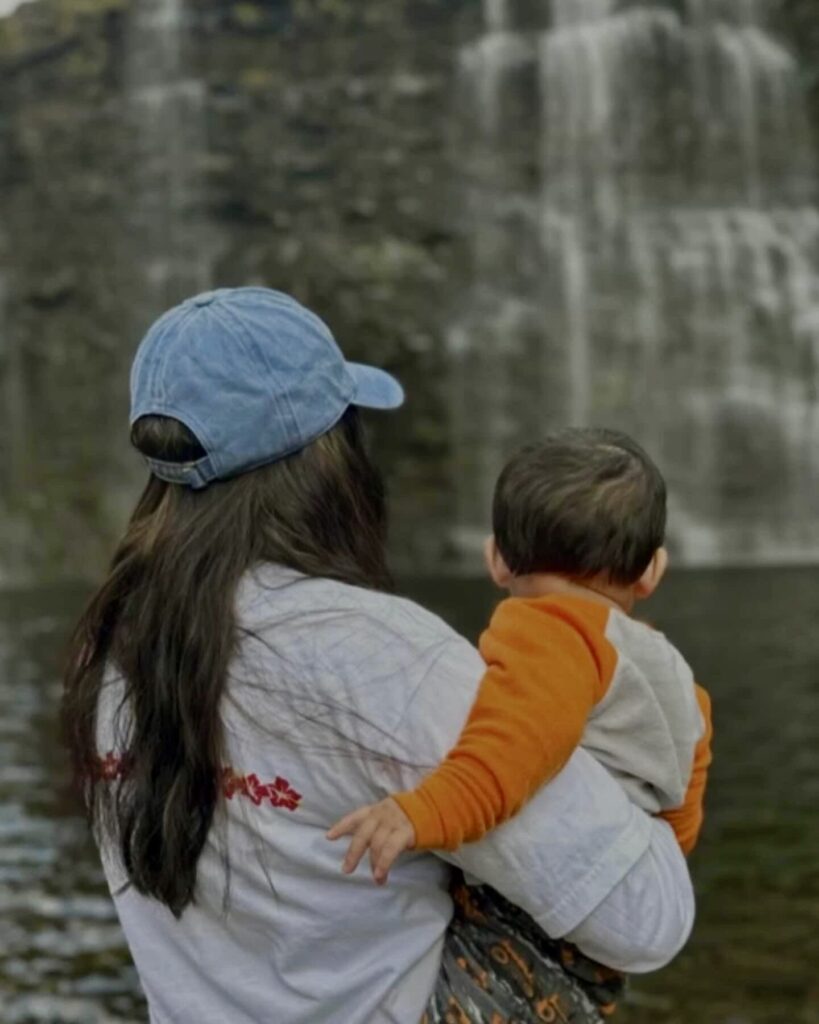This website uses cookies
We use cookies to ensure that we give you the best experience on our website. If you continue to use this site we will assume that you are happy with it.

Gender Justice Clinic students Carina Suarez ’27, Lejing Lin ’27, and Johanna Hussain ’26. On screen, Kelly Ellis ’27 and Nishanka Kuthuru ’27.
On the morning of September 4, 2025, U.S. Immigration and Customs Enforcement (ICE) conducted a raid at a nutrition bar factory in Cato, New York, detaining several workers, including a client of Cornell Law School’s Gender Justice Clinic. The client, Maribel Lopez, had fled Guatemala and was awaiting a decision on her asylum appeal. Despite her valid work authorization and family ties in the United States, including three young children—one a U.S. citizen—she was taken first to the Oswego Border Patrol Station, then to a Customs and Border Protection facility in Texas, before being deported to Guatemala in violation of her legal protections. Her whereabouts were unknown until she was finally able to call her family just before being deported on September 7—only three days after the raid, during which time she was unable to contact the Gender Justice Clinic.
The case drew national attention and was featured in the New York Times for its illustration of escalating immigration enforcement actions under new federal directives. Read the article here.

Maribel’s daughter and two-year-old son.
Maribel arrived in the United States in 2018 with her two children, seeking safety and asylum after fleeing years of horrific domestic violence in Guatemala. Her initial asylum application was denied, but an appeal—filed by Cornell Law’s Asylum and Convention Against Torture Appellate Clinic and now pending before the Board of Immigration Appeals—offers hope for reconsideration. The appeal is supervised by Clinical Professor of Law Estelle McKee, with ongoing support from the Gender Justice Clinic and Farmworker Legal Assistance Clinic. Maribel’s older children have since been approved for special immigrant juvenile status, while her youngest child—born in the United States—had just celebrated his second birthday the night before the raid.
Back in Guatemala, Maribel remained in hiding from her abuser with no job or stable place to stay.
In the chaotic days following the raid, the Gender Justice Clinic team—students Kelly Ellis ’27, Johanna Hussain ’26, Nishanka Kuthuru ’27, Lejing Lin ’27, Carina Suarez ’27, and their clinic director, Elizabeth Brundige—mobilized immediately. They worked to locate their client, reassure her frightened family, coordinate with ICE officials, and prepare emergency legal filings. They also helped the family complete New York State parental designation forms to ensure care for the toddler and coordinated with clinic alumna Nathalie Greenfield ’21, who launched a fundraiser to support the family’s living expenses.
According to the Department of Homeland Security’s Office of the Principal Legal Advisor in Buffalo, Maribel’s deportation was later confirmed to have been “inadvertent.” On November 6, ICE officials approved an application for significant public benefit parole, paving the way for Maribel’s return to the United States. However, despite acknowledging their error, ICE determined she will remain in detention upon her return while her asylum appeal continues.
On the evening of November 12, Maribel was notified that she would be returned to the United States the next morning. Since returning to the United States on November 13, Maribel has been detained in El Paso, Texas. ICE’s Enforcement and Removal Operations in Buffalo informed Brundige that Maribel would remain in custody in El Paso pending the outcome of her legal proceedings.
For students, the experience was both heartbreaking and galvanizing.
“It was disheartening to see our client, who followed everything the government asked of her for years, suffer because the law was reinterpreted to detain and deport as many immigrants as possible,” said Hussain. “But it was also amazing to see professors, fellows, and clinic students band together so quickly to respond to these emergency situations.”
“When our client was detained and then unlawfully deported, it made the news stories real for me,” said Ellis. “I’ve been frustrated and heartbroken watching what’s happening to immigrants all over the country, but I was glad to have an opportunity to channel that energy into actually helping people who were affected.”
As the Cornell Law clinics continue to advocate for Maribel’s safe return and release, the case underscores both the life-and-death consequences of immigration enforcement errors and the vital role of experiential legal education in preparing future lawyers to respond swiftly, compassionately, and effectively in moments of crisis.
“Despite the challenges we faced, I couldn’t be more in awe of our clinical programs team,” added Suarez. “Everyone moved quickly to research legal avenues and brainstorm ways to help. For me, this experience not only highlighted the importance of pro bono work, but also the strength and collaborative spirit of our clinical programs. It reaffirmed that we are learning what it really means to be ‘lawyers in the best sense.’”